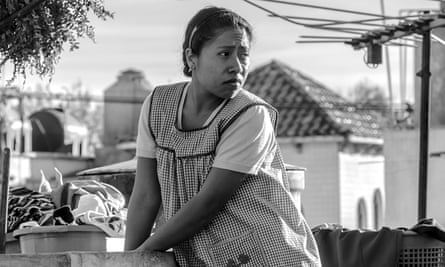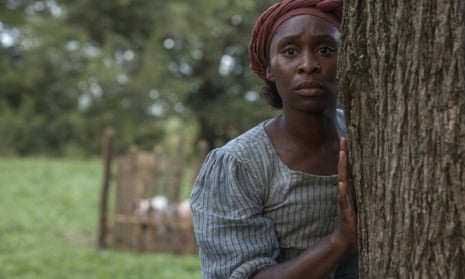For Oscar voters, what makes a great performance has disturbingly narrow criteria for non-white performers. The observation that people of colour are only ever recognised for playing slaves and criminals, that their stories are only ever seen as important when they deal with tragedy and suffering, does not strictly belong to the unenlightened past. This week’s Oscar nominations prove that such judgments are planted firmly in the present.
The kinds of roles being written for people of colour over the past decade have begun to expand to encompass a wider range of experiences. Just recently we were graced with the luminous Jennifer Lopez as savvy stripper Ramona in Hustlers; newcomer Nora Lum (Awkwafina) as the conflicted granddaughter of a dying matriarch in The Farewell; Lupita Nyong’o in a remarkable two-in-one turn in Jordan Peele’s Us. This all goes without mentioning the incredible performances that never quite picked up steam: Alfre Woodard in Clemency, for instance, or Song Kang-Ho in Parasite. But never mind the fertile pickings. This year the Academy has nominated one person of colour – Cynthia Erivo as Harriet Tubman in Harriet. This outcome is dismaying, partly because it falls neatly into a familiar pattern: a person of colour performing a racially specific form of suffering, the outlier in a sea of white nominees.
Erivo’s nomination for Harriet, a film that received middling reviews, is not a preposterous decision. Actors are often recognised for individual work that might stand out in an otherwise mediocre film (take Renée Zellweger in Judy). I’m not bothered by the quality of Erivo’s performance. There are far more egregious entries on that front, with the likes of Charlize Theron for Bombshell, or Scarlet Johansson for Jojo Rabbit, reaping nods (have the Oscars ever been a legitimate meritocracy?). Far more worrisome is what Erivo’s nomination suggests about the way Academy voters evaluate performers of colour, who seem to be the most visible, and taken the most seriously, within the trappings of white pity.
That voters overlooked a performance like Nyong’o’s in Us, a chilling interpretation of two sides of the same self, is telling. It doesn’t matter that this performance matches, if not surpasses entirely that of Joaquin Phoenix’s in Joker, even though both actors play, with tremendous physical commitment, psychologically tormented characters in genre films. Instead, the Academy prefers the Nyong’o who starred in 12 Years a Slave (2013), a film in which she is a slave, raped and humiliated. For these efforts, so difficult for the conscience to ignore, she was awarded best supporting actress.
In the last decade, only 14 women of colour were among the 100 women nominated by the Academy for the best actress and best supporting actress awards. There were even fewer men of colour (nine out of 100). That the same types of roles – slaves, nannies, and maids – continue to be the magic ticket to the red carpet, feels particularly ugly considering the range of parts played by white nominees. This year, for instance, the characters of Erivo’s fellow best actress nominees include a Fox newswoman, an icon of classic Hollywood, an aspiring young writer, and a hopeful divorcee. In 2019, Yalitza Aparicio was nominated for her performance in Alfonso Cuarón’s Roma. Aparicio is one of the few Latin American actresses to receive the honour, joining Adriana Barraza as a deported nanny in Babel, and Catalina Sandino Moreno as a drug mule in Maria Full of Grace.

As moving as these performances are, these films leave a bitter taste as they reaffirm tired conceptions of Latin American women. Aparicio plays a housemaid silently enduring racism and neglect, which recalls another Academy favourite – Tate Taylor’s The Help (2011), which stars Octavia Spencer and Viola Davis as resilient maids, as well! Such slim parameters betray the desire, perhaps even the need by Oscar voters, for a particularly cheap form of pathos, one that simplifies and minimises the experiences of non-white people by placing them on the margins or in the past. Those performances that don’t square with this mould are often considered too “light,” too niche, or too subversive for the Academy, all of which indicates the incredible myopia of its voting body and the thinly veiled racism that guides it.
Perhaps hoping for a consistently diverse pool of Oscar nominees is blind optimism; the more time passes, the anomalous triumphs of films such as Barry Jenkins’ Moonlight, feel like a fever dream. By opening up its membership to more women and people of colour, and enlisting diverse talent such as John Cho, Issa Rae, and Tiffany Haddish to present its nominations, the Academy has attempted to create an image of inclusivity. But given this year’s batch of nominees, that commitment has proven to be both superficial and a bad joke.

